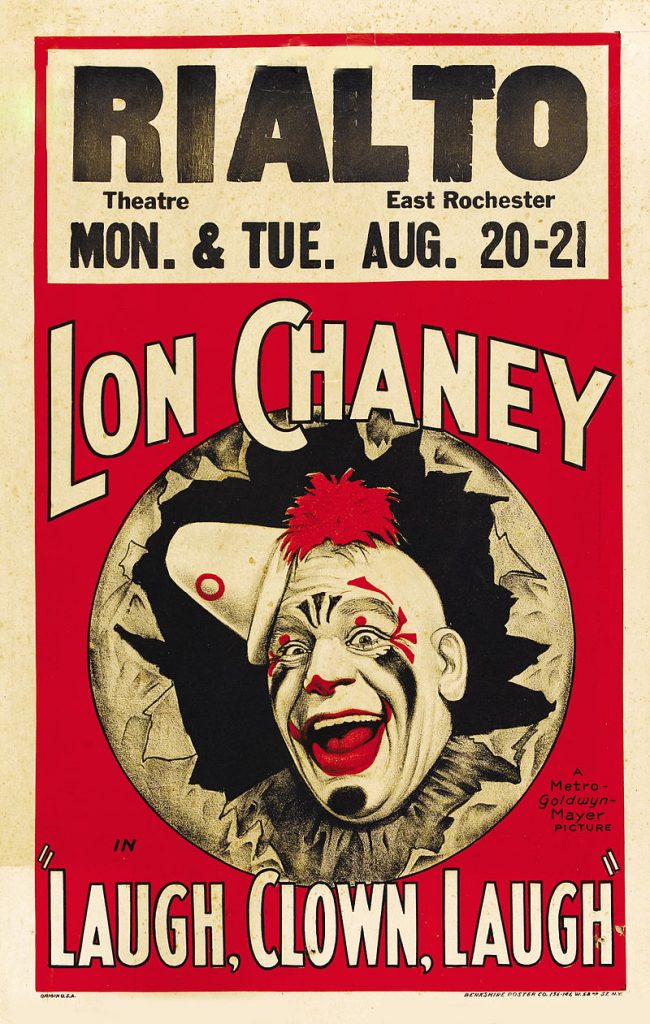Starring: Lon Chaney
Grade: A-
“Women bring bad luck”. Simon, this isn’t even remotely the problem.
Your buddy is in love with his underaged adopted daughter…
Summary
During the springtime in the Italian hills, a travelling circus rolls by to perform for commoners. The two clowns of the circus, Tito (Chaney) and Simon (Bernard Siegel), do a small “lost finger” gag without their makeup, to the delight of a small crowd. Following this, they hand out flyers to everyone about their upcoming show. That night, we see a glimpse of their act, with the two of them in full costume and makeup as a big crowd cheer them on.
The next day, Tito and Simon, who live out of their wagon, do some basic chores outside in a forest area. As Tito does his thing, he hears crying from a small distance. He investigates to find a small crying child sitting by herself. Tito picks up the child and brings her over to Simon to tell him she must have been abandoned by her family. He wants to adopt her but Simon refuses, arguing they should give her up to an orphanage because woman bring bad luck. Simon decides to keep her anyway. After being able to stop her crying by way of a few entertaining gags, he is able to make Simon ease up on the idea by naming the girl after him in “Simonetta”.
Years later, Simonetta (Loretta Young) is a teenager and still lives and works with Tito, Simon, and the circus. She now performs and does tightrope work, impressing other workers of the circus to the point where the main guy that works there makes her an official part of Tito and Simon’s act, as long as they make her look older. An ecstatic Tito helps fix Simonetta’s hair to make her look more grown but eventually a hairdresser takes over. Tito then comes to the conclusion that she needs a rose to put in her hair. Agreeing with this advice, Simonetta goes to find one near the circus grounds. She goes to a garden belonging to Count Luigi Ravelli (Nils Asther). Getting caught on Luigi’s barbed wire fence trying to snatch a rose, Luigi spots her, helps her out of it, and wraps up her injured leg. She explains how she wanted a rose for her hair, so Luigi gives her one immediately. Also on Luigi’s property, there’s some kind of luncheon party going on outside and his girlfriend (or wife, not really sure) Lucretia (Gwen Lee) sees Luigi show up with Simonetta. Following a quick introduction, Luigi takes her back to the bedroom to tend to her wounds and flirt with her some more. Lucretia pops in, but Luigi isn’t embarrassed at all, even after Lucretia demands Simonetta leave. Luigi flirts with Lucretia to get her out of the room but once she goes, he turns to see Simonetta has already left through the balcony window. For some reason, this causes Luigi to start laughing uncontrollably.
Back at the circus, Simon tells Tito he refuses to perform with them if Simonetta officially becomes part of their act, and he dares Tito to try and succeed without him because he made Tito. Once Simon leaves, Simonetta comforts Tito and hugs him. Following this hug, Tito realizes Simonetta is all done up to look older, and he’s amazed at how beautiful she is. Horror is seen in his face soon after because of his attraction, so he changes the subject and begs her to help him get Simon back.
Three years later in the office of a famous neurologist in Rome, the neurologist tells Luigi his spells of uncontrollable laughter are “due to a life of self-indulgence”, saying his emotions have ruled him for so long he’s lost control, and he’s lived too well and loved too many. Before Luigi goes, the doctor tells Luigi that if he ever falls in love with a woman sincerely, his laughing will disappear. Next, a visibly older and sadder Tito walks in the room for his appointment, and Luigi starts laughing in his face before going to the balcony to collect his thoughts. Tito is told by the doctor he’s suffering “from some sort of suppression…perhaps a hopeless love”. He says when his “hopelessness is gone”, he will be well. Once again, this guy suggests getting a woman to solve his problem.
I’m starting to question where this guy got his license.
Anyway, Tito starts to break down because he realizes the woman he loves is Simonetta and falling in love with his adopted teenage daughter is all kinds of wrong. He knows this and doesn’t know what to do. The doctor says he needs a diversion, something to make him laugh to get him out of this dry spell. He takes him to the balcony Luigi is on and points out the promotional poster for “Flik the Clown”, suggesting he go the clown’s show because he’s sure to make him laugh. Tito reveals this is impossible because he is Flik. Shocked, the doctor leaves the two alone and goes back inside. Luigi uses this time to explain he wasn’t laughing at Tito earlier, it’s just his affliction. He can’t help himself just like how Tito can’t help but cry. Back in the room, Simonetta talks to the doctor, and he encourages her on how she can help Tito. Eventually, Tito and Luigi befriend each other and realize they can help cure each other’s problems. They both go back into the room, and Tito greets Simonetta. He introduces her to Luigi, but they both realize they’ve met awhile back. The three of them leave together, becoming this three-person friend group en route to solving their respective problems. Tito and Luigi really do help each other, but they don’t realize the common denominator in their ability to overcome their problems is Simonetta, the woman whom both of them secretly love.
My Thoughts:
For a silent film, I wasn’t expecting a plot like this.
Based off of the play, Laugh, Clown, Laugh gives off the vibe of a tragedy-based theatrical production, with a disturbing, yet gripping story. I was amazed at how well the premise was pulled off, especially for not being able to communicate the true feelings of everyone through sound. This is why I love watching silent movies. The acting has to be very expressive and performed at a high level because you can only do so much without words to get the message across accurately. With this being said, Lon Chaney was fantastic as troubled father Tito. He nails the clown sequences with ease, channeling his inner circus performer to come off as a believable and energetic star with an ability to entertain the masses. However, this side of Tito isn’t what this story is about. As we know, it becomes increasingly less important because of his personal life and how he can’t get over his true feelings for Simonetta. Seeing Tito in his depressive state is the most impressive part of Chaney’s performance. His internal struggle to admit his true feelings tears apart his insides and becomes the reason for his slow unravelling. To present this in a silent movie is more than difficult, but Chaney shows how good of an actor he is, giving us one of the most underrated performances of his career. There’s so much more to him than playing grotesque monsters. The man behind the makeup is an all-around talent, capable of handling extremely delicate material when given the chance.
Tito is awful for thinking in the manner he does, but it works because he suffers from it, knowing he’s wrong. It forces him to go back and forth with how to deal with it until he loses it. It’s an internal conflict like no other, and Chaney does a phenomenal job in conveying these emotions to the audience. Despite being blessed with the ability to make the world laugh and being regularly cheered because of it, none of it can supersede his unresolved feelings for Simonetta as he combats them on a daily basis.
Minus the ending, my favorite scene in this Chaney showcase was when he confronts Luigi about the pearl necklace and assumes he wants Simonetta for himself. In full clown makeup, he stares bullets into Luigi with this vicious, ready-to-explode expression. I wish they did a closeup of it because it was so striking, only further intensified by the makeup. When he slaps Luigi, I was taken aback. A pissed off Luigi explains himself and things are calmed down for a bit, but the leadup to it was incredible. Later in this scene, they both admit their love for Simonetta (after they relapse into their separate afflictions), but Tito insists Luigi try to get her first. If she admits she loves Luigi, Tito promises to never tell her about his feelings because she can only love one of them. Plus, the embarrassment of telling her and being turned down (as her adoptive father no less) would be something he could never live down. If he were to ever admit his feelings, things would be forever changed, for better or worse. Following this, the mixture of emotions we go through is tough to behold. At first, she turns down Luigi, and he silently acknowledges this to the performing Tito. We see the happiness in Tito’s face, as he finishes the rest of his show with pure enthusiasm to a cheering crowd. It means nothing to Tito though. The crowd could’ve been silent, and it wouldn’t have mattered. He can finally tell her how he feels! He’s over the moon happy, realizing that it might be meant to be.
Then, everything comes crashing down.
She changes her mind once she sees Luigi’s note attached to the pearls and decides this is enough to give him a chance. It happens just as Tito runs over to them once his performance is over, and he sees the two kiss. Immediately, he falls apart. Overrun with emotion and stuck with the fact Simonetta loves someone else and he can never tell her how he feels, he hangs his head and can barely move. In the defining moment of the movie, Simon accepts applause from the crowd, but he knows they want to applaud Tito as well. He forces the mentally unwell Tito to get in front of the crowd one final time for them, uttering the words “Laugh, clown, laugh…even though your heart is breaking!”. The way the scene is set up, the acting, the placement of everything, and the acknowledgement from Simon was a chef’s kiss to a perfectly done scene.
The first half is a little slow, but things pick up once we first see Tito’s reaction to Simonetta in her first attempt at dressing “grown up”. He seems amazed at first, but we then see the alarming look on his face. You can tell his internal thoughts have even scared him. He doesn’t say anything about it at first, but the audience knows his true feelings. This forces him into a deep depression he can’t shake, and we see him years later going to the doctor because of his inability to shake his sadness. He’s devoted as her adoptive father, but Simon can even tell something is up. Did you see Tito’s face when Simon accuses him of falling in love with her? This immediate denial but telling expression shows us how it’s tearing him apart. Then, the rage builds, and the aggression comes out. Even though Simon’s right, the accusation throws him off completely, and he almost fights Simon. Later, it boils over when Luigi shows up in the dressing room. Weirdly enough, Simon never tells him it’s wrong. The only thing he does is plant the seed of Luigi being the one that’ll snatch her away from Tito. It’s even tough for the viewer because we’re not sure what to root for. Tito is the protagonist, but we know (as does he) what he wants is wrong. This is what hooks us. We want to see how things will turn out even though each possible outcome doesn’t feel right, setting us up for a tragic third act that is fitting, emotional, and highly memorable.
I wasn’t buying Luigi’s uncontrollable laughter, but it’s a movie from the 20s. Something off-putting like this is a commonplace character trait in older movies. If anything, it served its purpose of the story with him being the exact opposite of Tito’s state of sadness, making sense of their team-up idea. I’m also a bit bothered by Simonetta’s true feelings as well. She seems easily swayed with Luigi, but then goes to Tito to admit her love for him during her engagement to Luigi. It doesn’t seem genuine, and it’s oddly timed. We have no reason to believe she would dupe him, but it doesn’t feel right. I was also perplexed by Tito’s refusal to believe her once she leaves the room, saying her soul was saying “Luigi” the whole time. I understand as to why he would say something like this, but he has no reason to not believe her. It’s more like Tito has internalized the fact he shouldn’t pursue but hasn’t admitted it outright, blaming it on her to rationalize why he can’t go through with it. This scene gave me more questions than answers, despite Simonetta’s earnestness. Even then, it sets up the ending and Tito’s full descent into madness very well. Every last bit of the final ten minutes was must-see and was exactly the ending the story needed. You know things are about to go haywire when Tito shows up in his full clown costume for a rehearsal, scaring even Simon.
Laugh, Clown, Laugh is a tragedy of Shakespearean proportions but considering Loretta Young was 14 at the time of filming, and I’m assuming the character was around the same age, maybe this clown deserved to die.
With that being said, the movie is actually well done with very good shots, lasting imagery, great cinematography and music, and an awesome performance from screen legend Lon Chaney. There are some hiccups and some characterization issues I had, but the second half of the film is brilliant, capped off with a poetic finale that makes us feel like we saw something truly special.





+ There are no comments
Add yours